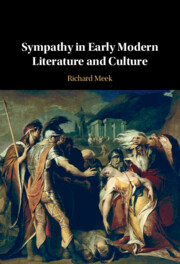Book contents
- Sympathy in Early Modern Literature and Culture
- Sympathy in Early Modern Literature and Culture
- Copyright page
- Contents
- Figures
- Acknowledgements
- Note on Texts
- Introduction
- Chapter 1 ‘A sympathy of affections’
- Chapter 2 ‘Compassion and mercie draw teares from the godlyfull often’
- Chapter 3 ‘Grief best is pleased with grief’s society’
- Chapter 4 ‘O, what a sympathy of woe is this’
- Chapter 5 ‘Soveraignes have a sympathie with subjects’
- Chapter 6 ‘As God loves Sympathy, God loves Symphony’
- Coda
- Bibliography
- Index
Introduction
‘Solemn Sympathy’
Published online by Cambridge University Press: 27 April 2023
- Sympathy in Early Modern Literature and Culture
- Sympathy in Early Modern Literature and Culture
- Copyright page
- Contents
- Figures
- Acknowledgements
- Note on Texts
- Introduction
- Chapter 1 ‘A sympathy of affections’
- Chapter 2 ‘Compassion and mercie draw teares from the godlyfull often’
- Chapter 3 ‘Grief best is pleased with grief’s society’
- Chapter 4 ‘O, what a sympathy of woe is this’
- Chapter 5 ‘Soveraignes have a sympathie with subjects’
- Chapter 6 ‘As God loves Sympathy, God loves Symphony’
- Coda
- Bibliography
- Index
Summary
The Introduction interrogates the current critical view of early modern sympathy as a physical or occult process. It proposes that literary critics and historians have neglected the coexistence of the emotional and physical senses of the word sympathy in the early modern period. Exploring a broader range of intellectual frameworks – including religious culture, literary theories of imitation, and humanist pedagogy – complicates the idea that sympathy was primarily an automatic or a humoral phenomenon. The Introduction also argues that translations of European vernacular texts, including Du Bartas’s The Historie of Judith (1584) and Montaigne’s Essais (1603), played a significant role in introducing the affective meaning of sympathy to English readers. This expanding emotional vocabulary – along with other material and social changes in the period – led to an increased theorization of pity and compassion, whereby individuals came to be regarded as a connected network of distinct selves rather than a homogenous social group. In this way, the emergence of sympathy as a term and concept prompted a reconsideration of the nature and boundaries of early modern selfhood.
Keywords
- Type
- Chapter
- Information
- Sympathy in Early Modern Literature and Culture , pp. 1 - 34Publisher: Cambridge University PressPrint publication year: 2023

